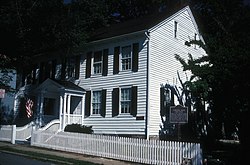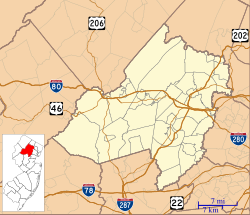
Morristown is a town and the county seat of Morris County, in the U.S. state of New Jersey. Morristown has been called "the military capital of the American Revolution" because of its strategic role in the war for independence from Great Britain. Today this history is visible in a variety of locations throughout the town that collectively make up Morristown National Historical Park.

The Daughters of the American Revolution (DAR) is a lineage-based membership service organization for women who are directly descended from a person involved in the United States' struggle for independence. A non-profit group, they promote education and patriotism. The organization's membership is limited to direct lineal descendants of soldiers or others of the Revolutionary period who aided the cause of independence; applicants must have reached 18 years of age and are reviewed at the chapter level for admission. The DAR has over 185,000 current members in the United States and other countries. Its motto is "God, Home, and Country".

Philip John Schuyler was an American general in the Revolutionary War and a United States Senator from New York. He is usually known as Philip Schuyler, while his son is usually known as Philip J. Schuyler.
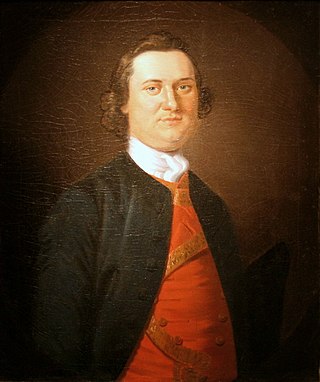
Lewis Morris was an American Founding Father, landowner, and developer from Morrisania, New York, presently part of Bronx County. He signed the U.S. Declaration of Independence as a delegate to the Continental Congress from New York.

Morristown National Historical Park is a United States National Historical Park, headquartered in Morristown, New Jersey, consisting of four sites important during the American Revolutionary War: Jockey Hollow, Ford Mansion, Fort Nonsense, and Washington's Headquarters Museum.

Buccleuch Mansion is located in Buccleuch Park in New Brunswick in Middlesex County, New Jersey, along the Raritan River.

Jockey Hollow is the name for an area in southern Morris County, New Jersey farmed in the 18th century by the Wick, Guerin and Kemble families. The origin of the name is still uncertain, but was used as such at the time of the American Revolution. For most of the Revolutionary War, it was used by portions of Continental Army as a winter camp site, and it housed the main Continental Army during the "Hard Winter" of 1779–80, believed to be the harshest winter in recorded history.

The Ford Mansion, also known as Washington's Headquarters, is a classic 18th-century American home located at 30 Washington Place in Morristown, New Jersey that served as General George Washington's headquarters from December 1779 to June 1780 during the American Revolutionary War.
James Cochran was an American politician and a member of the United States House of Representatives from New York.
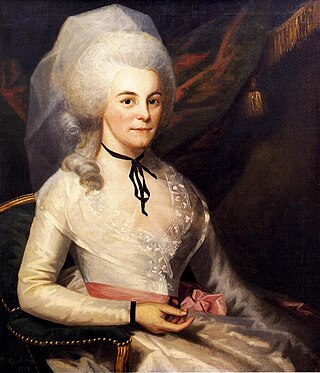
Elizabeth Hamilton, also called Eliza or Betsey, was an American socialite and philanthropist. Married to American Founding Father Alexander Hamilton, she was a defender of his works and co-founder and deputy director of Graham Windham, the first private orphanage in New York City. She is recognized as an early American philanthropist for her work with the Orphan Asylum Society.

Charles McKnight was an American physician during and after the American Revolutionary War. He served as a surgeon and physician in the Hospital Department of the Continental Army under General George Washington and other subordinate commanders. McKnight was one of the most respected surgeons of his day and was remembered by one colleague as "particularly distinguished as a practical surgeon … at the time of his death (he) was without a rival in that branch of his profession."

Boxwood Hall State Historic Site, located at 1073 East Jersey Street in Elizabeth, New Jersey, is a historic house museum operated by the state of New Jersey. Boxwood Hall was built about 1750, and is a National Historic Landmark for its association with Founding Father Elias Boudinot (1740-1821), who lived here from 1772 to 1795. Boudinot, a lawyer, politician, and diplomat, was president of the Continental Congress 1782–83.

John Barker Church, a.k.a.John Carter, was an English born businessman and supplier of the Continental Army during the American Revolution. He returned to England after the Revolutionary War and served in the House of Commons from 1790 until 1796. He was known for his marriage to Angelica Schuyler Church, of the prominent American Schuyler family, and being the brother-in-law of Alexander Hamilton, who died in a duel in 1804 with Aaron Burr, with whom Church had also had a duel in 1799.

The Dey Mansion, located in modern-day Wayne, Passaic County, New Jersey, United States, and originally known as Bloomsburg Manor, played an integral role in the American Revolutionary War. Built by Col. Theunis Dey in the 1770s, it served as Washington's Headquarters on several occasions. Today, the Dey Mansion is currently open year-round with guided public tours Wednesday through Sunday.

The New Jersey Brigade Encampment Site, also called the New Jersey Brigade Area, was used by the Continental Army in the winter of 1779–80, during the American Revolutionary War. The site is located in Bernardsville, Somerset County, New Jersey and extends into Harding Township, Morris County. About 1,300 men of the New Jersey Brigade were encamped here. It is one of four contributing sites of the Morristown National Historical Park. The Cross Estate Gardens property was added in 1975.
Dr. Jabez Campfield was a colonial-era doctor, one of the earliest to set up practice in Morristown, New Jersey. He served as a surgeon in the Continental Army during the American Revolutionary War. During the Continental Army's winter encampment in Morristown in 1777, Dr. Campfield helped inoculate soldiers against a smallpox outbreak that spread through the army and the area that winter. Dr. Campfield was a surgeon on the Sullivan Expedition in upstate New York in the summer and autumn of 1779, during which he kept a detailed diary which has been preserved and published. During the winter encampment of 1779-1780, surgeon general Dr. John Cochran stayed in Dr. Campfield's home, and his home served as a "flying hospital". Dr. Cochran's niece, Elizabeth Schuyler, came to stay in Dr. Campfield's home, and while there fell in love and became engaged to Founding Father Alexander Hamilton.

The John Parker Tavern is a historic building located at 2 Morristown Road in the borough of Bernardsville in Somerset County, New Jersey. Originally known as the Vealtown Tavern, it was frequently used by Continental Army soldiers during the American Revolutionary War. It was added to the National Register of Historic Places on December 14, 1978 for its significance in commerce, military history, and local history.
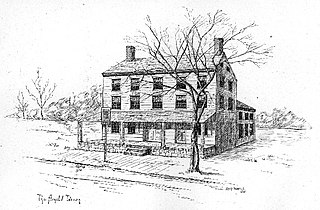
Jacob Arnold's Tavern, also known as the OldArnold Tavern and the Duncan House, was a "famous" historic tavern established by Samuel Arnold circa 1740. Until 1886, it was located in Morristown Green in Morristown, New Jersey. In 1777 it served as George Washington's headquarters during the Revolutionary War, and it was the site of Benedict Arnold's first trial in 1780. The National Park Service claims "Much of [Morris]town's social, political, and business life was conducted at Arnold's Tavern" during the Revolutionary era.

The Dr. Lewis Condict House is a historic house located at 51 South Street in Morristown of Morris County, New Jersey. Built in 1797, it was added to the National Register of Historic Places on April 3, 1973, for its significance in architecture and health/medicine. In 1937, the Woman's Club of Morristown purchased the house for its headquarters. The house was added as a contributing property to the Morristown District on October 30, 1973.
